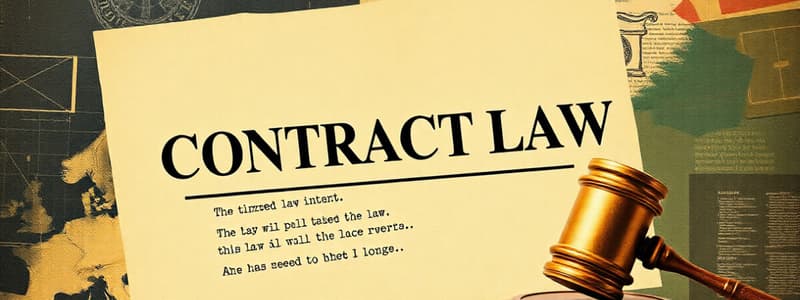Podcast
Questions and Answers
What characteristics define a valid contract?
What characteristics define a valid contract?
- It is invalid from the start.
- It possesses the essential elements to be legally enforceable. (correct)
- It lacks legal force but is potentially valid.
- It can be canceled by one party.
Which legal status of a contract is considered invalid from its inception?
Which legal status of a contract is considered invalid from its inception?
- Unenforceable
- Void (correct)
- Voidable
- Enforceable
What does an unenforceable contract imply?
What does an unenforceable contract imply?
- It is valid and must be enforced in court.
- It is void and has no legal standing.
- It is a valid contract that cannot be enforced. (correct)
- It is never valid under any circumstances.
What example is used to illustrate an implied contract?
What example is used to illustrate an implied contract?
What is a fundamental aspect of implied contracts?
What is a fundamental aspect of implied contracts?
What happens if a passenger fails to pay a cab driver after their ride?
What happens if a passenger fails to pay a cab driver after their ride?
What distinguishes a voidable contract from a void contract?
What distinguishes a voidable contract from a void contract?
Which legal status indicates a contract that is potentially valid but lacks legal force?
Which legal status indicates a contract that is potentially valid but lacks legal force?
What happens to an executed contract once all parties have fulfilled their obligations?
What happens to an executed contract once all parties have fulfilled their obligations?
Which of the following qualifies as an executory contract?
Which of the following qualifies as an executory contract?
What is a significant factor in determining breach of contract for an executory contract?
What is a significant factor in determining breach of contract for an executory contract?
Which of the following would represent an ongoing executory contract without an end date?
Which of the following would represent an ongoing executory contract without an end date?
In what circumstances can an oral real estate agreement be considered enforceable?
In what circumstances can an oral real estate agreement be considered enforceable?
Which of the following statements is true about the term 'executed' in contract discussions?
Which of the following statements is true about the term 'executed' in contract discussions?
What is one key characteristic of an executory contract?
What is one key characteristic of an executory contract?
Which of the following examples represents an executory contract with a defined end date?
Which of the following examples represents an executory contract with a defined end date?
What is an express contract?
What is an express contract?
Which scenario exemplifies a unilateral contract?
Which scenario exemplifies a unilateral contract?
What distinguishes an express contract from an implied contract?
What distinguishes an express contract from an implied contract?
Which of the following is an example of a unilateral contract?
Which of the following is an example of a unilateral contract?
What is a primary characteristic of a bilateral contract?
What is a primary characteristic of a bilateral contract?
Why are express contracts considered best practice for real estate professionals?
Why are express contracts considered best practice for real estate professionals?
In what scenario would an executed contract apply?
In what scenario would an executed contract apply?
What consequence can arise from relying on implied contracts in real estate?
What consequence can arise from relying on implied contracts in real estate?
Which of the following best describes a unilateral contract?
Which of the following best describes a unilateral contract?
Which is NOT a recommended practice when engaging in contracts in real estate?
Which is NOT a recommended practice when engaging in contracts in real estate?
What does the term 'bilateral contract' refer to?
What does the term 'bilateral contract' refer to?
What is a disadvantage of implied contracts?
What is a disadvantage of implied contracts?
How does an express contract benefit the parties involved?
How does an express contract benefit the parties involved?
What is typically required for a sales contract involving real property?
What is typically required for a sales contract involving real property?
What is a common example of an express contract in real estate?
What is a common example of an express contract in real estate?
Flashcards
Implied Contract
Implied Contract
A contract where the terms are not explicitly stated but are understood by the parties' actions or conduct.
Express Contract
Express Contract
A contract where all terms are explicitly stated in writing or orally by the parties involved.
Bilateral Contract
Bilateral Contract
A contract where both parties make promises to perform specific actions.
Unilateral Contract
Unilateral Contract
Signup and view all the flashcards
Executed Contract
Executed Contract
Signup and view all the flashcards
Valid Contract
Valid Contract
Signup and view all the flashcards
Unenforceable Contract
Unenforceable Contract
Signup and view all the flashcards
Void Contract
Void Contract
Signup and view all the flashcards
Voidable Contract
Voidable Contract
Signup and view all the flashcards
Doctor's Visit
Doctor's Visit
Signup and view all the flashcards
Restaurant Meal
Restaurant Meal
Signup and view all the flashcards
Cab Ride
Cab Ride
Signup and view all the flashcards
Binding Contract
Binding Contract
Signup and view all the flashcards
Breach of Contract
Breach of Contract
Signup and view all the flashcards
Contract to Closing - Executory
Contract to Closing - Executory
Signup and view all the flashcards
Oral Real Estate Agreement
Oral Real Estate Agreement
Signup and view all the flashcards
Study Notes
Contract Legal Status
- Valid Contract: Possesses the essential elements for legal enforcement.
- Unenforceable Contract: Potentially valid, but lacks legal force.
- Void Contract: Invalid from inception, lacks legal effect.
- Voidable Contract: Potentially valid, but one or more parties can rescind.
Implied Contracts
- Established by actions, not written documents or explicit discussions.
- Legally binding like explicit contracts.
- Common examples:
- Doctor Visit: Patient owes payment for services.
- Restaurant Meal: Customer pays for consumption.
- Taxi Ride: Passenger pays for transportation.
- Barber Shop: Customer pays for services.
- Social conventions play a crucial role.
- Professionals spell out implied contract terms to avoid misunderstandings (e.g., posted rates for taxis and restaurant menus).
- Real estate license holders should avoid implied contracts to prevent confusion and potential litigation; instead favor formal written contracts.
Express Contracts
- Explicitly stated intentions and expectations of the parties.
- All terms and conditions are identified and agreed upon.
- Opposite of implied contracts (inferred from actions).
- Common in real estate: listing agreements, buyer representation agreements, sales contracts, lease agreements.
- Easier to seek damages if a party fails to perform.
- Written form is crucial for dispute resolution and prevention.
Bilateral Contracts
- Both parties make promises to perform actions.
- Creates reciprocal obligations for both parties.
- Common in business.
- Example: Anna contracts with Brandon's Bulldogs for a puppy. Both parties make promises as to what they will do.
Unilateral Contracts
- One party (offeror) makes a promise in exchange for a reciprocal act by another party.
- Second party (offeree) is NOT obligated but has the option to accept.
- Two parties, but one promise.
- Offeror is obligated once offeree accepts.
- Lack mutuality.
- Example: Seth Bullock's bounty poster for a criminal (the government made a promise, but citizens were not obligated until they chose to act).
Executed Contracts
- All terms have been fulfilled by all parties.
- Ceases to exist after fulfillment of promises.
- No further legal power to bind parties.
- Example: Amy pays Shelly for a sweater.
Executory Contracts
-
Not fully performed.
-
Identifies a contract's stage of existence.
-
Usually aims to be fully executed.
-
Two elements:
- Binding contract.
- One or more parties have yet to perform.
-
Executory and Courts: Courts are less inclined to entertain arguments about breach of contract if a contract isn't materially complete.
-
Ongoing contracts: (exception to the above). Courts will consider ongoing contract failures at any time.
-
Ongoing contract examples: Rental lease (periodic payment), equipment lease (rent), rent-to-buy lease, car lease.
-
Oral real estate agreements: Not considered executory since they are not legally binding in the real estate realm (per statute of frauds).
-
Execution confusion: Saying "executed a contract" often means only that the contract was signed, not that it's completed.
Contract Classifications
- Express: Explicit terms and conditions.
- Implied: Created by actions.
- Unilateral: One party makes a promise.
- Bilateral: Exchange of promises from both sides.
- Executory: Not fully performed.
- Executed: Fully performed.
Studying That Suits You
Use AI to generate personalized quizzes and flashcards to suit your learning preferences.




